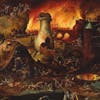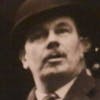17. Better The Devil You Know

Having previously spoken to near-death experience witnesses, I was keen to uncover how science viewed this extraordinary phenomenon. I tracked down data scientist David Gerrelli. I wasn’t expecting what I heard.
Personal comment:
Having spoken with Kathy McDaniel in 4. Misfit in Hell to Heaven ExPat about her personal near-death experience, I was seeking some form of confirmation that near-death experiences could be more than just hallucinations. David provided anecdotal evidence that supported this search, even if that evidence opened a new Pandora’s box for us to contemplate. Certainly very thought-provoking. Thanks David for sharing your findings with us.
AUDIOCLIP FROM BETTER THE DEVIL YOU KNOW
Out of body experiences...
David is obviously a passionate researcher of near-death experiences (NDE's). Because of the podcast's length and style, we could not dig deep into his specialist area of NDE's - distressing NDE's.You can read about David’s conclusion to questions such as “What happens when we die?”, “What is Hell?” and “Am I going there?” In his book How to Escape from Hell.
Batting the Breeze receives a small commission from sales of this book.
You can also contact David through his website howtoescapefromhell.com.
Next week's episode:
[Episode 18] The Arizonian Nomad Can you imagine selling all your worldly possessions, your house, your car, your furnishings and reducing your ownership of ‘things’ to a 22-inch suitcase and a backpack? Well, that’s exactly what today’s guest did, leaving Arizona to travel the world as a digital nomad. Find out how she did it.
Last week's episode:
[Episode 16] Double Trouble Can you imagine what it’s like to breathe through someone else’s lungs? Alastair Henry does. In 2020 he had a double lung transplant at the age of 75. He’s only too aware of his responsibility to the donor, to make the best of this gift of extra life. Alastair shares his story and thoughts on organ donation.
- Email us at steve@battingthebreeze.com
- Chat with us on Facebook
Thanks for listening!
ATTRIBUTIONS:
Follower of Hieronymus Bosch, Public domain, via Wikimedia Commons
TRANSCRIPT
[00:00:01] David: "Oh my God, have I been a good person? Am I going to go to hell?" And not just religious people; atheists, agnostics, whoever it is. It's like Mike Tyson once said, "Everybody's got a plan until they get punched in the face". [00:00:20] [00:00:40]
Introduction
[00:00:54] David: I've been working in digital technology since 1995, so I have 27 years of experience [00:01:00] across three continents, which includes Europe, Oceana, and now North America. I've worked across a broad spectrum of industries within data science, we've worked with vast volumes of data, millions of records in many cases.The person conducting that role has a logical and structured mindset. It's a requirement in order to work within this particular field. We're able to draw conclusions or provide reliable [00:01:20] insights.
[00:01:20] Steve: This is David Gerrelli. He's not just a data scientist. A short while back he started to apply his data science knowledge towards the subject of near-death experiences. I was keen to talk to him as a follow up from my conversation with Kathy McDaniel back in episode [00:01:40] four. Kathy shared her near-death experience, and after that conversation I wanted to dig a bit deeper into the science that lay behind the subject. So I started by asking David how he was originally attracted to the concept of NDE's, near-death experiences.
Attraction to near-death experiences
[00:01:58] David: So I've lived with disease [00:02:00] since I was 21 years old, a chronic condition called Crohn's Disease, and my version of that condition is quite serious. It's moderate to severe Crohn's disease and through multiple surgeries and critical care incidents... through the past 20, 25 years, I've had to confront my mortality on more than one occasion.
[00:02:16] David: In addition to this I had drug addiction issues as a young man, thoughts of [00:02:20] suicide, and I often questioned whether I was destined for heaven or hell. I couldn't put my trust in theology, and at an early age was aware of near-death experiences, and so I eventually decided to put my skills and experience to use in determining if there's any validity to these reports.
Definition
[00:02:32] Steve: Let's start by getting clear on what a typical definition of an NDE looks like. [00:02:40] Wikipedia says...
[00:02:41] Steve: A near-death experience is a profound personal experience associated with death or impending death, which researchers claim share similar characteristics. When positive, such experiences may encompass a variety of sensations, including detachment from the body, feelings of levitation, total serenity, security, warmth, the experience of absolute [00:03:00] dissolution, and the presence of a light. When negative, such experiences may include sensations of anguish and distress. So there are 'positive' and 'negative' NDE's Negative NDE s are also known as 'distressing' NDE's and are treated quite differently from positive ones.[00:03:20] I asked how common NDE's were worldwide.
[00:03:24] David: 20 million people approximately in the United States, 50 million in Europe and over 100 million in China are estimated to have had a near-death experience. Of that number, only thousands are reported, but still these numbers represent something that is relatively common in human [00:03:40] existence.
Scientific methodology
[00:03:40] Steve: Okay. And tell us about the scientific methodology used to assess the validity of an NDE.
[00:03:48] David: So there is some science behind near-death experiences and how we measure the probability of any given experience being a near-death experience, or, for example, an intensive care hallucination, which is quite common [00:04:00] in acute critical care situations. The most popular effort for determining if someone had one of these extraordinary experiences is called the Greyson Scale.
[00:04:07] Steve: Yes! I'm particularly looking for differentiation from something that could just be an hallucination. Hopefully the Greyson scale is going to achieve this. Enter Dr. Bruce [00:04:20] Greyson, Professor of Psychiatry and Neurobehavioral Sciences at the University of Virginia.
[00:04:31] David: The Greyson Scale asks 16 specific questions regarding someone's experience that are common to NDEs. Some of them people may be familiar with, such as, "Did you feel [00:04:40] separated from your body?", whereas others are likely to be new or even surprising to people, such as, " Were your thoughts speeded up?" "Did you come to a border or point of no return" or, "Were your senses more vivid than usual?" Each question has a brief, unique answer. For example, the question, " you see deceased or religious spirits?" includes the answers, "No", " I sensed their presence" or "I actually saw them".[00:05:00] These questions are scored from zero collectively with the other scores to determine if this is actually very likely to be an NDE.
[00:05:07] David: So this method is used extensively it comes to measuring NDEs and determining if it is hallucination. And also because NDEs are a religious subject, it's not uncommon to find [00:05:20] people within the religious field using NDEs as a platform for their own beliefs, which can break the data in effect, because then you end up with opinion as opposed to data.
Distressing NDEs
[00:05:29] Steve: David highlighted that he personally focuses on negative or distressing NDEs as opposed to positive NDEs. One of his [00:05:40] challenges is that these distressing NDEs aren't separated in the overall data. This means that working through witness reports can be painstaking. There are other issues as well.
David:The witness may not know that their experience was distressing. They have no context. And many a time when somebody has... a distressing experience, they're not [00:06:00] comfortable talking about And they may change the facts because they feel it somehow shows them to be a bad person. And because only four to 12% of all near-death experiences are distressing, we needed some method, some data method in order to pull those records out... and then use that information to come to some conclusions.
[00:06:16] Steve: Now, as David's primary research [00:06:20] focuses on distressing NDEs and these lead to studying witness experiences of hell, of life reviews with God and of Egrigore - a devil like concept made up from the negative collective thoughts of groups of people - it was taking me too far outside my comfort [00:06:40] zone. I wanted to stick to a more tangible discussion about experiences that could be related to in perhaps a more digestible form. If you are interested in investigating the distressing side of NDEs, I'd suggest you head over to the show notes to find details of David's book, "How [00:07:00] to escape from hell". It's a comprehensive study of distressing NDEs based on hundreds of witness reports and using his years of data science to try and make sense of what an afterlife might look like. Anyway, we headed back to discuss some experiences that were more [00:07:20] down-to-earth. In other words, easier to understand, but nonetheless difficult to explain. I was determined to make David work hard to convince the neutral on this subject that NDE's could be real. David took the challenge.
Reality check
[00:07:36] David: [00:07:40] There was an interesting study conducted in April, 2013 by a Dr. Steven Laureys,to measure brain activity in three different conscious and subconscious states. One of those states was sleeping. The second state was just regular day-to-day, going about your business, having your breakfast, having lunch, talking to friends, whatever it may be, just regular stuff. And the [00:08:00] third was NDEs. So the third was to measure the brainwaves of people that were having an NDE... and then compare these brainwaves to see which of those was more vivid, more real. So actually what happened was in the study, the dreams were the least active in terms of brainwaves, followed by, which is a [00:08:20] surprising part, day-to-day living. So the waking world was the second most active state of the human brain. The third was near-death experiences. So what we found in effect, or what the doctor found in effect was that actually a near-death experience is more real than real life. These kind of investigations are taking place. [00:08:40] because it's very easy to say that a near-death experience is a hallucination.
Positive NDE
[00:08:43] Steve: Yes, that's the point. Because it didn't seem incongruous to me that near-death experiences could be hallucinations, and this research didn't seem to contradict that. So I pressed David further for more recognizably real examples. Back to Dr. [00:09:00] Greyson and his research.
David: When somebody is deceased, there are cases that once that person is resuscitated, they're able to recite whilst they were dead precisely what was said in the room where they were being resuscitated. They can describe the conversation, they can describe what happened, specifically what activities [00:09:20] were performed. They can describe things in the room that they couldn't have seen from their position on the bed within the actual recovery room. There are many scenarios where somebody who is clinically dead is able to recite conversations that occurred in other parts of the hospital.
[00:09:34] Steve: Now we are cooking, so it's one thing to get your head around somebody clinically [00:09:40] dead hearing a conversation in the same room, but David's now talking about situations where conversations are overheard by the clinically dead that are in other parts of the hospital. Back to Dr. Greyson again.
[00:09:54] David: When he went back to his patient, which was a young girl, and she woke up and they resuscitated her after she had [00:10:00] respiratory failure and she was clinically dead, she started to recite what he said, but also she recited the conversation he had four rooms down with one of her relatives. So, she was able to recite conversations throughout the hospital, which she couldn't have possibly been present in because she was clinically dead.
[00:10:16] Steve: And are you saying within the case of that little girl that the reason she was able to hear a [00:10:20] conversation in another room is 'cause she'd gone into the other room?
[00:10:23] David: Correct. So she... had somehow left her body, right? If a human being is able to leave their body, it would imply that human consciousness can continue to exist outside of the human body and also retain memories and conscious thought make decisions and then [00:10:40] replay that back once they reconnect with their human, physical body.
Aldous Huxley
[00:10:43] Neil: The conversation was bringing to mind episode 10, when I spoke with Neil Harris about Holotropic Breathwork, a safe means of achieving expanded states of awareness, usually for healing purposes. I told David how Neil had [00:11:00] talked about Aldous Huxley, the 20th century writer and philosopher who had thought about the brain as a reducing valve. Here's Neil explaining that thought once again. He postulated that there's an enormous range of potential experience out there, far more than we can cope with in our everyday lives. And [00:11:20] in order to manage the necessities of everyday living, our brain switches off the tap on stuff that's too much to contemplate so that when we take psychedelics or experience Holotropic Breathwork, the reducing valve is opened and other possibilities and alternative realities can flood in.
[00:11:38] Steve: I asked David if his [00:11:40] findings resonated with that in any way.
[00:11:43] David: I didn't know that was ever said, and I think that's a really good way to explain it. That came up in my research. So our human brain only has a capacity to hold a tiny amount of what we actually know in our consciousness. So one of the things that happens very common in NDEs is when people start to pass over into the afterlife, they [00:12:00] start to remember things. There's a young girl, who had a near-death experience and she had no artistic skill whatsoever prior to her near-death experience. But when she came back she was able to draw incredible life-like artwork and she drew a picture of Jesus. [00:12:20] Apparently she saw it. She was able to draw these incredibly life-like pictures, not just of Jesus, but of scenes within the afterlife. This is very common. They also come back with things like quantum mechanics, like a... deep knowledge of quantum mechanics. So mothers and housewives that had no interest or no knowledge of [00:12:40] such subjects, they come back with skills that they didn't leave with, which is also very fascinating as well. How do you explain? How do you explain people seeing what happened in other rooms or even in the room they were in when they were dead? How do you explain people coming back, speaking different languages they didn't leave with?
Summary
[00:12:56] Steve: I feel as if I've worked David hard and there's a [00:13:00] lot here to contemplate and hearing some of this experience is certainly thought-provoking. But I suggested that there will still be the sceptics.
David: I think it's okay to be a sceptic. You just need an open mind. One thing that I think is really important is always ask questions. Ask questions about everything. Never accept what you're told. What I would encourage people to do, [00:13:20] because I don't think enough people do it, is to go out and look for yourself. There are publicly available thousands upon thousands of witness reports from as early as yesterday. So there are reports being dropped every single day and it won't take long looking through these near-death experience reports to actually see the [00:13:40] themes yourself, to see the patterns. You don't need to be a scientist to see that these are reoccurring themes and that the stories all link up.
Steve: I'll leave you to draw your own conclusions on near-death experiences. I'll continue to contemplate mine. From David's perspective, having intensely studied near-death [00:14:00] experiences, hell, the afterlife, Egrigore and so on, what's his fundamental takeaway from it all?
David: It's not a scientific one, it's a human one, which is forgive yourself. Like learn to forgive yourself. Don't carry the weight of your own guilt and just acknowledge that you're only human. [00:14:20] And humans make mistakes.
[00:14:40]
















